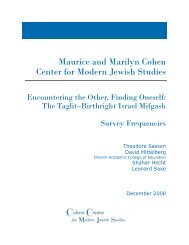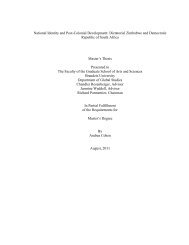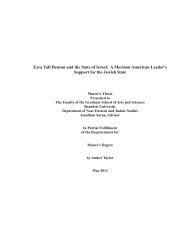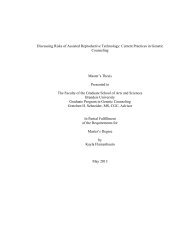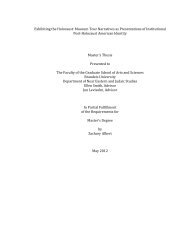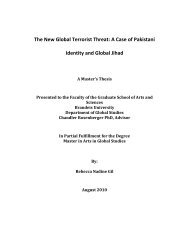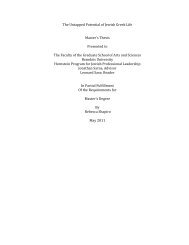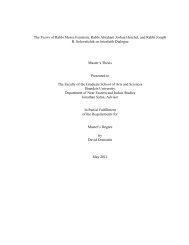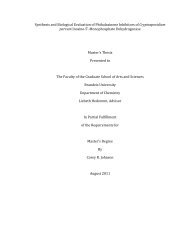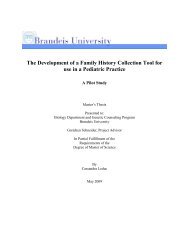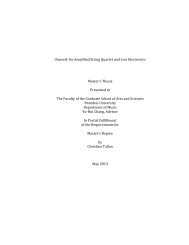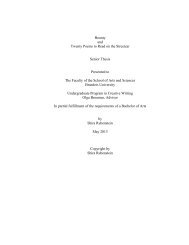A Familiar Frontier: The Kennedy Administration in the Congo ...
A Familiar Frontier: The Kennedy Administration in the Congo ...
A Familiar Frontier: The Kennedy Administration in the Congo ...
Create successful ePaper yourself
Turn your PDF publications into a flip-book with our unique Google optimized e-Paper software.
<strong>Kennedy</strong> <strong>in</strong>tended it to apply to foreign policy as well. One of <strong>the</strong> new frontiers to whichAmericans could look <strong>in</strong> 1960 was that of Africa, with its abundance of newly<strong>in</strong>dependent countries, and it was a frontier for which <strong>the</strong> new President was uniquelywell-suited. As a Senator, <strong>Kennedy</strong> had made his name with an impassioned speech <strong>in</strong>1957 <strong>in</strong> support of Algeria’s attempt to ga<strong>in</strong> <strong>in</strong>dependence from France. <strong>The</strong> speech wasdeeply unpopular with <strong>the</strong> French press as well as Americans of both parties, <strong>in</strong>clud<strong>in</strong>gPresident Eisenhower and Eisenhower’s two-time Democratic opponent, AdlaiStevenson. 2 Yet it made a name for <strong>Kennedy</strong> <strong>in</strong> both domestic and <strong>in</strong>ternational circles,and led him to be appo<strong>in</strong>ted Chairman of <strong>the</strong> brand new Senate Foreign RelationsSubcommittee on Africa <strong>in</strong> 1959. <strong>Kennedy</strong>’s adviser Ted Sorensen wasted no time <strong>in</strong>look<strong>in</strong>g for ways to “exploit” this position, hop<strong>in</strong>g to establish <strong>Kennedy</strong> as a “concerned,farsighted, progressive American leader” as well as “<strong>the</strong> Senator who knows aboutAfrica.” 3 <strong>Kennedy</strong> used his familiarity with Africa to great effect <strong>in</strong> attack<strong>in</strong>g <strong>the</strong>Eisenhower <strong>Adm<strong>in</strong>istration</strong>, particularly as his opponent <strong>in</strong> <strong>the</strong> 1960 presidential electionwas Vice-President Richard Nixon. In his speech on Algeria, <strong>Kennedy</strong> had describedEisenhower’s policy on <strong>the</strong> Third World as “cautious neutrality on all <strong>the</strong> real issues, anda restatement of our obvious dependence upon our European friends…and our obviousdesire not to become <strong>in</strong>volved.” 4 After this scath<strong>in</strong>g condemnation, <strong>Kennedy</strong> turned hisstatus as <strong>the</strong> Chairman of <strong>the</strong> Subcommittee on Africa <strong>in</strong>to a series of thirteen speechesabout <strong>the</strong> cont<strong>in</strong>ent before a variety of <strong>in</strong>terested bodies <strong>in</strong> 1959 and 1960. <strong>The</strong> speechesusually made <strong>the</strong> same general po<strong>in</strong>ts, connect<strong>in</strong>g Africa’s <strong>in</strong>dependence movement to2 Richard D. Mahoney, JFK: Ordeal <strong>in</strong> Africa (New York: Oxford University Press, 1983), 203 Memo from Sorensen to <strong>Kennedy</strong>, President’s Office Files, Box 114, Folder 64 Qtd. <strong>in</strong> Mahoney, JFK: Ordeal <strong>in</strong> Africa, 205




